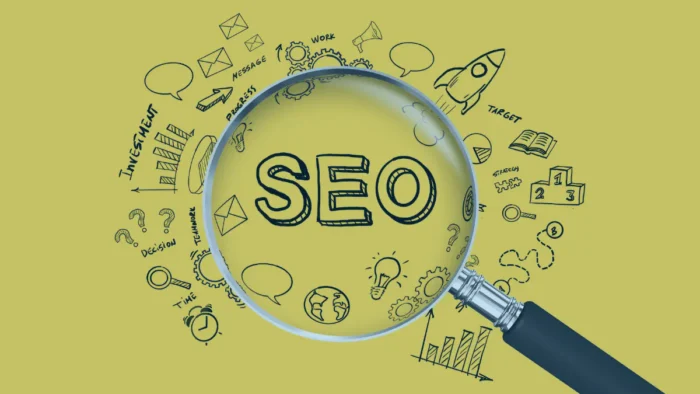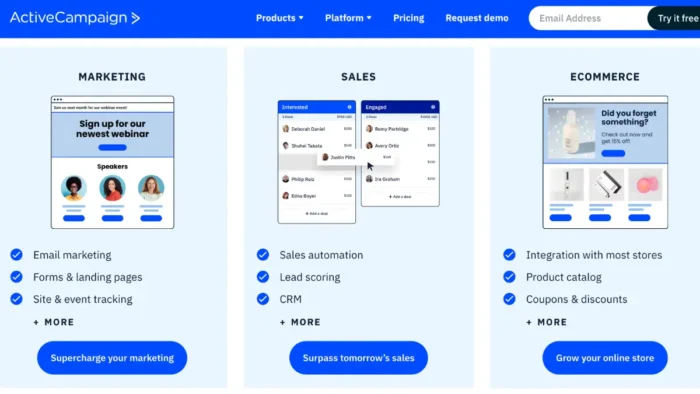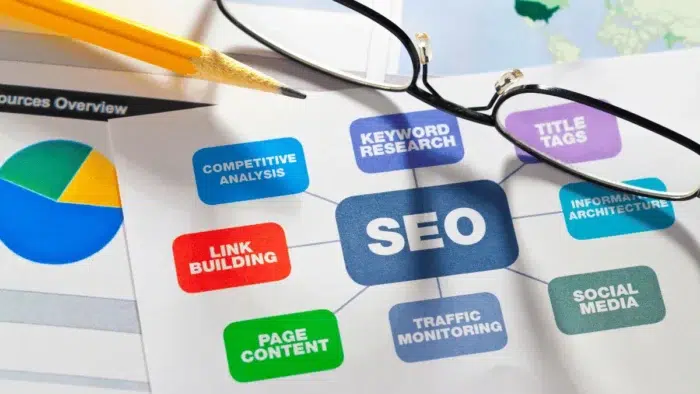If you’re running a business, it’s important to ensure you do everything possible to grow and improve your company. Search engine optimization (SEO) techniques are one way to do this. SEO can help your website rank higher in search engine results pages (SERPs), meaning more people will see your site and potentially be interested in your offer.
Here are six ways in which SEO can help your business grow.
Why is SEO Important for Business Growth?
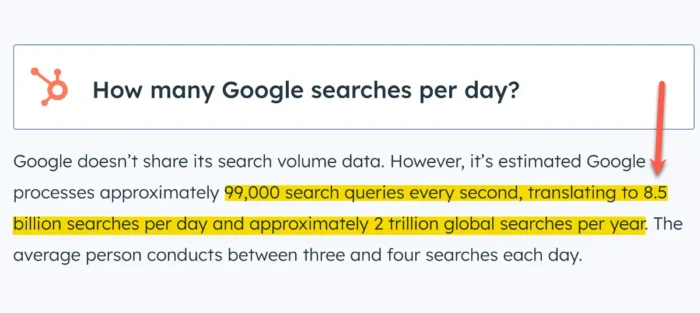
How can SEO grow your business?
Search engine optimization is the process of optimizing your website and its content to rank higher in SERPs. This means that when someone searches for a keyword related to your business, your website is more likely to appear at the top of the results. With over 8.5 billion Google searches per day, having a strong SEO strategy is crucial for getting your business in front of potential customers.
SEO Basics: How Search Engines Work
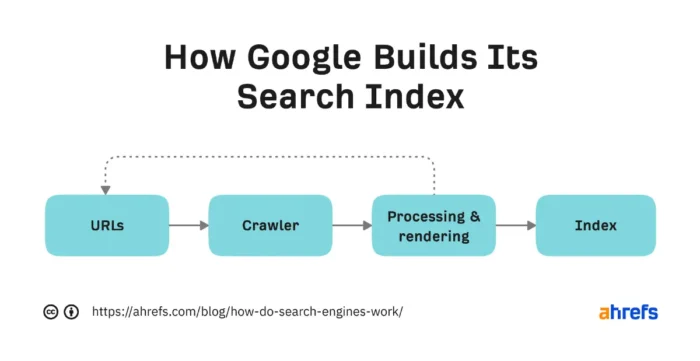
Understanding the operation of search engines is fundamental to mastering SEO. Search engines like Google and Bing use complex algorithms to deliver the most relevant and authoritative web pages in response to a user’s query.
To do this, search engines perform three primary functions: crawling, indexing, and ranking.
Crawling
Search engine bots, often called spiders or crawlers, scour the Internet to find new or updated web pages. These crawlers follow links on websites to discover content.
Indexing
Once a web page has been crawled, the search engine works to understand and categorize the page’s content, a process known as indexing. This allows the search engine to quickly retrieve the page when it’s relevant to a user’s search.
Ranking
When a user enters a search query, the search engine sifts through its index to provide the most relevant results. It ranks these results based on numerous factors, including the content quality, the search query’s relevance, and the number and quality of links pointing to the page.
Knowing the Difference Between Paid and Organic Searches
Understanding the distinction between paid and organic searches is critical when developing an effective SEO strategy.
Organic Search
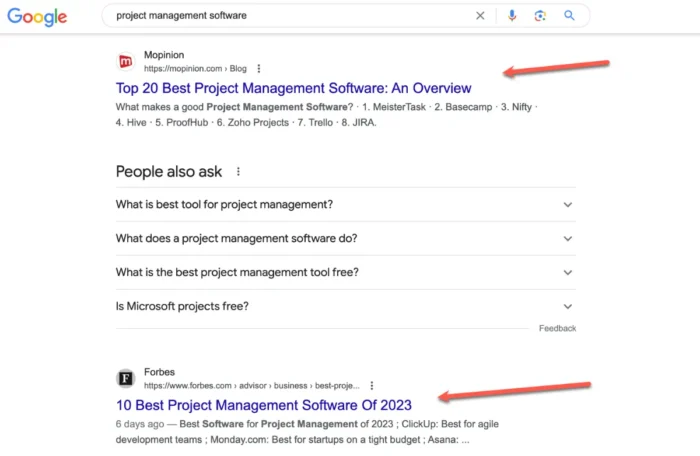
Organic searches stem from users naturally typing in search terms related to your business or industry. If your SEO is effective, your website will rank high in search results, attracting more visitors without needing paid promotions or PPC campaigns.
Organic searches are a long-term strategy — they require time to build but generate sustained website traffic and have an air of authenticity that can improve your brand’s credibility.
Paid Search
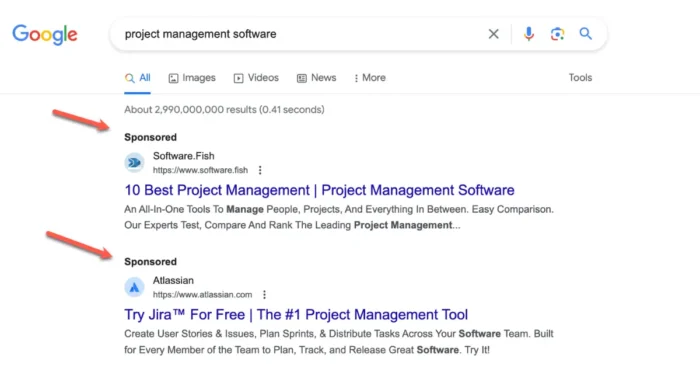
Paid searches, on the other hand, involve paying search engines to display your website prominently for selected keywords. This strategy is often referred to as pay-per-click (PPC) advertising. Ads appear at the top of SERP, ensuring instant visibility.
However, paid searches require an ongoing financial investment and may not yield a high return if not managed properly.
How SEO Helps Your Business?

Let’s see how SEO helps in business.
1. SEO Increases Your Online Visibility
One of the main benefits of SEO is that it can help increase your brand’s visibility.
When people search for keywords that are related to your business, they’ll be more likely to see your website and learn about what you have to offer. This can lead to increased brand awareness and recognition, which is essential for any business that wants to grow.
You only need to research the right keywords and implement them well on your website for the search engine to recognize what your website is all about.
As highlighted by the team behind Cleveland SEO, you should include the keyword in the title, meta-description, header tags, and throughout the body of the text. It should also highlight the website’s main USP (unique selling proposition).
2. Provide Long-term Value
SEO is not a short-term marketing tactic that you can use quickly to boost your website’s ranking. Instead, it’s a long-term strategy that can provide value for your business over time.
Once you’ve implemented effective SEO techniques, your website will continue to rank well in search results, providing valuable traffic and leads for your business indefinitely.
This is in contrast to paid advertising, which only provides short-term results. Once you stop paying for ads, your website traffic will quickly drop off.
This makes SEO a more cost-effective and sustainable option for businesses that want to grow over the long term.
3. SEO Brings Qualified Leads to Your Website
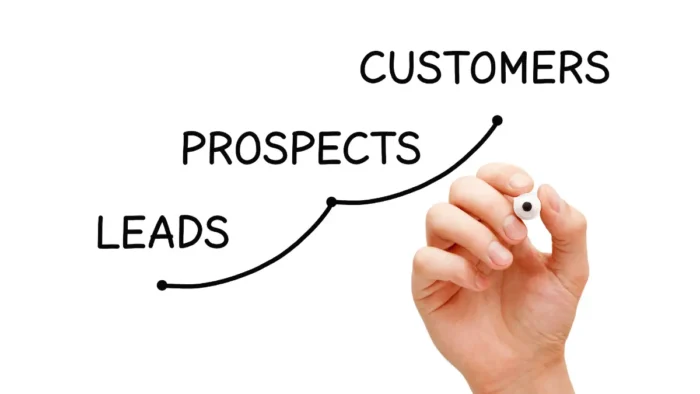
SEO is a highly targeted marketing strategy allowing you to reach the right audience for your business. When users search for specific keywords somehow related to your product or service, SEO ensures that your website appears in their search results.
Unlike broad-based traditional advertising, SEO enables you to reach people who are actively seeking what you offer, making them more likely to convert into customers.
Moreover, by using local SEO practices, you can target audiences in a specific geographic area, further refining your reach.
SEO can also help you generate more leads by increasing your website’s visibility and traffic.
When someone searches for keywords that are related to your business, they’ll be more likely to find your website and inquire about your products or services. This is an important benefit for any business that wants to grow, as generating new leads is essential for acquiring new prospective customers.
SEO can help you generate leads in two ways.
First, by increasing your website’s visibility, it will be seen by more people interested in what you offer.
Second, by improving your website’s ranking for relevant and targeted keywords, you’ll appear higher in search results when customers search for businesses like yours.
Related: 5 Benefits of Using People Search Engine
4. Create a Better Visitor Experience
SEO is not just about attracting more traffic to your website; it also focuses on improving the user experience once they’re there. This includes ensuring that your website is easy to navigate, has a robust internal linking structure, and loads quickly.
Additionally, SEO involves creating high-quality, relevant content that provides value to your users, which can increase the time they spend on your site and the chances that they’ll return in the future.
A better user experience can lead to higher conversion rates and more positive reviews, further boosting your website’s visibility in SERP. Lastly, SEO ensures your website is mobile-friendly, an essential factor given the increasing prevalence of mobile searches.
SEO can help improve the visitor’s experience on your website in several ways.
- First, optimizing your website for relevant keywords will make it easier for people to find what they want.
- Second, improving your website’s design and usability will make it more user-friendly and easy to navigate.
- Third, providing valuable and relevant content will allow people to visit your website and stay longer.
Of course, you’ll have to be well-versed with concepts like keyword research, on-page optimization, and technical SEO. If your company doesn’t lacks in-house expertise in these domains, it’s a good idea to look for an SEO agency for startups.
5. Builds Trust, Credibility, and Brand Recognition
SEO can also help build credibility and trust for your business. When users search for keywords somehow related to your business, they’ll be more likely to see your website as a credible and trustworthy source of information. So, SEO contributes to the improvement of your brand awareness. Credibility and trust are essential for acquiring new customers.
Credibility and trust can push a business to greater heights in various ways. When your business is credible and trusted by most clients, they will be more likely to buy your products or services. Moreover, they are more likely to refer you to other potential clients. Lastly, a credible and trustworthy business is always on top of the SERPs.
6. Organic Search Is a Good Source of Website Traffic
Organic traffic comes to your website from unpaid (or “free”) search engine results. This is in contrast to paid traffic, which comes from paid advertisements. SEO can help improve organic traffic to your website in two ways.
Organic search traffic is the best to have in your business as it is free, and thus, more profits are made. Secondly, this traffic helps improve your website ranking and the credibility and trust of your business. SEO helps improve this traffic by optimizing your website for relevant keywords and improving your website’s design and usability.
SEO Strategies for Driving Growth
Here are some of the most effective SEO strategies for driving growth:
1. Keyword Research
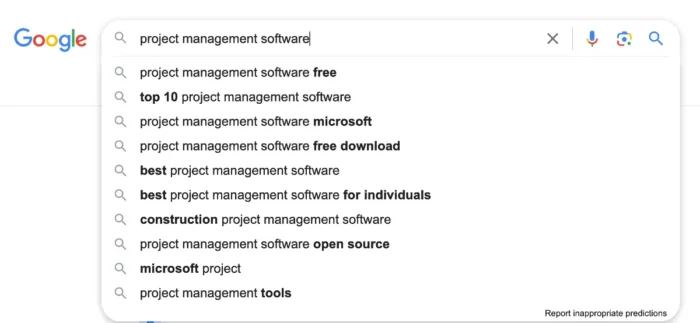
Regarding keyword research, you must identify and target specific keywords correlated to your business, industry, and other related keywords. Start by brainstorming keyword ideas that your customers will search for when they want to solve the problem that your business offers a solution.
To find keywords, you must conduct keyword research, and for this purpose, you can use different keyword research tools like SEMRush, Ubersuggest, and MOZ, or you can use Google’s own keyword planner tool.
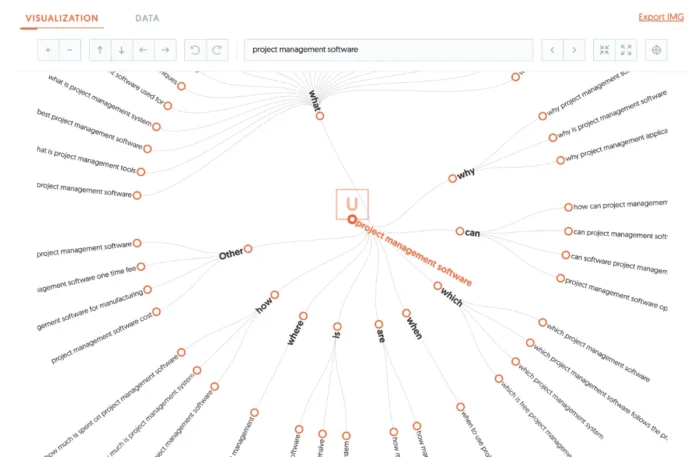
When you look at possible keywords, pay attention to the monthly search volume and keyword difficulty and balance these two factors by finding keywords with high search volume and low keyword difficulty. If there is high competition for some keywords, try to find long-tail keywords that will help you rank quickly.
These keywords will help your site rank higher in SERP, attracting more relevant traffic.
2. On-Page SEO Optimization

Make sure your website’s content is fully optimized for your target keywords. This includes using your target keywords in your titles, headers, and meta descriptions and incorporating them naturally within your content.
So, you must create helpful content optimized, ensuring that the targeted keywords are incorporated inside the title, headers, and meta description. For example, a company that creates project planning software would benefit from appearing for search queries related to “project management” or “project planning.”
The most effective way to increase traffic is by creating compelling content like videos, articles, and photos that provide valuable information to readers.
3. Quality Content Creation

If you are creating high-quality content, like a blog post that is informative and relevant to your audience regularly. This helps improve your organic rankings, engages your visitors, and encourages them to stay longer on your site.
So, creating quality content around your targeted keywords will help you grow visitors and, with the right conversation, grow your small business.
4. Link Building
Acquire backlinks from other reputable websites in your industry. Google sees these links as a sign of credibility and authority, which can boost your organic rankings.
It’s important to note that purchasing backlinks is considered link spam and is a direct violation of Google’s guidelines, which can result in harsh penalties.
5. Mobile Optimization
Ensure your website is mobile-friendly. With the increasing use of smartphones for internet browsing, search engines favor websites that provide a smooth experience for mobile users.
6. Local SEO

When it comes to local SEO, you must start with the local keywords related to your business and optimize your website for them. These local keywords, like “the best dog food in New York,” will help your business appear in local results from search, attracting potential customers in your targeted area.
This digital marketing strategy is important if your business serves a particular geographic area.
Local SEO also includes listing your business in online directory listings and emphasizing your location in your SEO strategy.
7. Social Media Integration
While not a direct ranking factor, integrating your SEO strategy with your social media efforts can help increase visibility and traffic to your website.
8. Website Performance Optimization
Ensure that your website loads quickly and provides a smooth experience for visitors. Slow site speed and performance can hurt your rankings and deter visitors.
9. Off-Page SEO
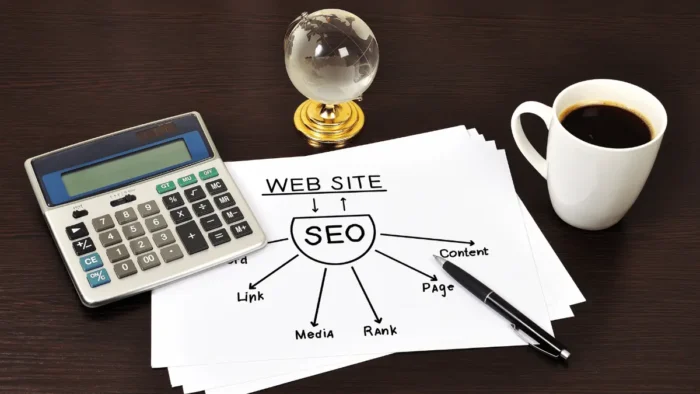
Off-page SEO refers to the actions taken outside of your own website to improve its rankings within SERPs. This typically involves improving the perception of a site’s popularity, relevance, trustworthiness, and authority. Such a perception is usually fostered by other reputable places on the internet (pages, sites, people, etc.) linking to or promoting your website, thus effectively vouching for the quality of your content.
Key off-page SEO strategies include link-building from authoritative sites, social media marketing, and influencer marketing. These techniques help generate external attention and lead to higher organic search rankings. The ultimate reward for a successful off-page SEO strategy is a significant increase in the site’s visibility, authority, and reach.
10. Technical SEO

Technical SEO refers to the process of optimizing your website for the crawling and indexing phase. This aspect of SEO involves making it easier for search engine spiders to understand and index your website’s content. The goal of technical SEO is to optimize the infrastructure of a website to enhance its overall visibility in rankings.
Key elements of Technical SEO include optimizing the website’s crawlability, structuring URLs appropriately, maintaining a secure browsing environment (SSL certificates), optimizing site speed, creating a responsive design for better mobile accessibility, and managing robots.txt files.
Site speed is crucial, as a slow-loading website can frustrate visitors and lead to higher bounce rates. Similarly, ensuring your website is mobile-friendly is essential as more users browse the internet on mobile devices.
Moreover, creating XML sitemaps and submitting them to search engines can help ensure all pages are found and indexed. Another important part of technical SEO is managing duplicate content, as duplicate pages can confuse search engines and negatively impact your ranking.
Effective technical SEO sets a solid foundation for your website that can support and enhance other SEO efforts, such as content optimization and link building.
SEO Complements Paid Marketing Efforts
SEO and paid marketing are two sides of the coin, working together to strengthen your brand’s online presence.
While paid marketing guarantees instant visibility and direct exposure to your target audience, SEO builds a strong foundation for your website to rank organically. This dual approach ensures sustained visibility.
SEO complements paid marketing efforts by enhancing the website’s quality, relevance, and usability, all crucial elements that search engines consider when determining the quality score of your paid ads.
A high-quality score can lead to lower costs per click, better ad positions, and a higher return on your ad spend. Furthermore, insights gained from your SEO efforts, such as keyword performance, audience behavior, and content engagement, can be leveraged to fine-tune your paid marketing strategies, creating a synergy that enhances your digital marketing efforts’ overall effectiveness and efficiency.
Search Engine Marketing (SEM)
SEM is a digital marketing strategy used to increase a website’s visibility in SERPs.
Unlike SEO, which aims to improve organic search results, SEM focuses on paid search advertising strategies such as pay-per-click (PPC) advertising, cost-per-click (CPC), and display advertising. These strategies allow you to pay for your landing page to appear in the “sponsored” section of SERPs, providing immediate visibility and targeted exposure.
Through keyword analysis and bidding, SEM enables you to reach potential customers at the perfect time — when they’re actively searching for products, services, or information relevant to your business’s offers.
How to Track SEO Performance

Tracking SEO performance is crucial for assessing the effectiveness of your SEO strategies and making necessary adjustments. Here’s how you can do it:
- Use Google Analytics: Google Analytics is a free tool that offers comprehensive data about your website’s traffic, including source of traffic, user behavior, and conversion rates.
- Setup Google Search Console: Google Search Console provides insights into your website’s performance in Google’s search results. It shows which keywords your site ranks for, click-through rates for each keyword, and the average position in the search results.
- Monitor Keyword Rankings: Use SEO tools like SEMRush or Moz Pro to track the rankings of your target keywords over time. Remember, SEO is a long-term strategy, and rankings can fluctuate.
- Measure On-Page Engagement Metrics: Monitor metrics like bounce rate, pages per session, and average session duration to understand how users interact with your site.
- Track Conversions: Conversions can be any desired action a user takes on your site, such as purchasing, filling out a form, or downloading a resource. You can set up conversion tracking in Google Analytics to monitor these actions.
Conclusion
SEO can help your business grow in many ways. By increasing your website’s visibility, traffic, and leads, SEO can help you build credibility and trust, improve the user experience, and generate more traffic. SEO is a great option if you’re looking for a sustainable way to grow your business. You can work with experts like SEO companies to help you implement an effective SEO strategy.

